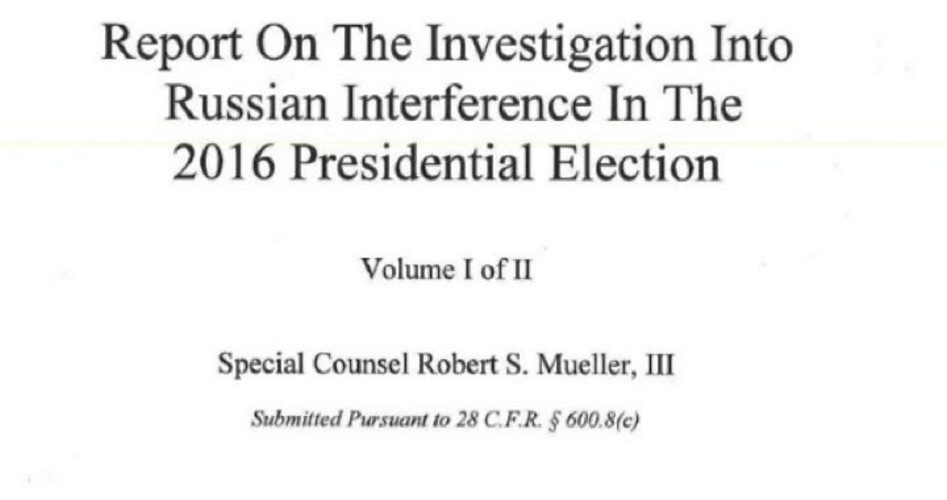
Special Counsel Robert Mueller’s 22-month-long investigation of alleged Russian collusion and interference in the 2016 election is summarized in a 448-page report released (in redacted form) Thursday. The wait is over; now the frenzy begins. Enemies of President Trump have claimed — since before he was even elected — that he colluded with Russia. The report, however, makes clear that there is no evidence of those claims. And it fails to provide sufficient evidence of obstruction.
That the Mueller investigation — which meandered far from its path — found no evidence of collusion between Donald Trump, his campaign, or his administration and Russia is not a startling revelation made by the report; that was already revealed last month with the release of a four-page summary sent to Congress. What the public release of the full, but redacted, report does do is flesh out — in lengthy language — the lengthy investigation’s findings.
Chief among those findings is that neither Donald Trump nor any of his campaign advisors conspired with Russia. Period. End of story. The dream of Democrats — who hoped against hope that the Mueller report would validate their fantasy — is over. The report, prepared by Mueller — who no one can accuse of being a Trumpeteer — makes the point clear enough even to penetrate the darkened minds of those who may wish to hang onto the fantasy, stating, “The evidence we obtained did not establish that the president was involved in an underlying crime related to Russian election interference.”
The report was released less than an hour after Attorney General William Barr told the media at a press conference in Washington that the report not only clears President Trump of accusations of collusion, but that it fails to show sufficient evidence of that other beast of burden so laden with Democrats’ hopes: obstruction. Speaking of the report’s findings that Russia did attempt to interfere with the 2016 election and was heavily involved in the leak of e-mails from the Clinton, Podesta, and DNC servers, Barr said, “We now know that the Russian operatives who perpetrated these schemes did not have the cooperation of President Trump or the Trump campaign,” adding, “That is something all Americans can and should be grateful to have confirmed.”
While the Mueller report does state that — based on “ten episodes involving the President” which Mueller and his team examined — “The president engaged in a series of targeted efforts to control the investigation,” Mueller did not make any conclusion on that point. In fact, the report clearly states that Mueller did not make a determination that the president committed the crime of obstruction because “fairness concerns counseled against” making such a determination “when no charges can be brought.”
The report reveals a classic case of weaseling out of something Mueller could not prove. While the main issue was collusion, and Mueller would not be able to weasel out of a determination on that allegation, obstruction came up later in his probe. So appearing to want to split the difference and realizing he could not prove obstruction, he also did not want to exonerate the president.
The report states:
Because we determined not to make a traditional prosecutorial judgment, we did not draw ultimate conclusions about the President’s conduct. The evidence we obtained about the President’s actions and intent presents difficult issues that would need to be resolved if we were making a traditional prosecutorial judgment. At the same time, if we had confidence after a thorough investigation of the facts that the President clearly did not commit obstruction of justice, we would so state. Based on the facts and the applicable legal standards, we were unable to reach that judgment. Accordingly, while this report does not conclude that the President committed a crime, it also does not exonerate him.
That portion is a prime example of why this report takes up 448 pages. Brevity and spin are not on friendly terms. Because the reality is that in those 11 words, all Mueller seems to say is, “Once I determined that there was nothing to allegations of obstruction, I made the determination not to make a determination.” One is left to wonder whether Mueller expects anyone to believe that in his 22-month-long witch hunt, he really did not have the time to conduct “a thorough investigation of the facts” and arrive at a place of “confidence” that “the President clearly did not commit obstruction of justice.” This writer is certain that he is not alone in his doubt of Mueller’s claims in this.
In his press conference, Attorney General Barr said there is insufficient evidence to show obstruction, because the evidence shows that the president had “non-corrupt motives” for his actions. Barr described Trump’s presidency as having been mired by allegations of corruption and collusion from the time before he was even sworn in and said that as Trump “entered into office, and sought to perform his responsibilities as President, federal agents and prosecutors were scrutinizing his conduct before and after taking office, and the conduct of some of his associates.”
Citing the report, which had not yet been made public, Barr said, “As the special counsel’s report acknowledges, there is substantial evidence to show that the president was frustrated and angered by a sincere belief that the investigation was undermining his presidency, propelled by his political opponents and fueled by illegal leaks.” So while some of President Trump’s actions may not have been the best moves he could have made, they did not rise to the level of obstruction.
So while the American people can brace themselves for an onslaught of liberal commentary from both the political and media Left that obstruction is still on the table, according to the attorney general — citing the report — it is not. At least not where the Department of Justice is concerned.
Instead, the report kicks the ball into Congress’ court by stating, “Congress has authority to prohibit a President’s corrupt use of his authority in order to protect the integrity of the administration of justice.” So while Democrats have been reluctant to openly discuss impeachment, that really is the only play they have left. If they choose to pursue it, it could be political suicide for 2020; if they choose not to, the obstruction dream will die right beside the collusion dream.
In the end, the report — long on words and short on substance — really serves as a written record of the fact that after 22 months, more interviews than this writer can recount in the space allowed for this article, the review of more documents than this writer can recount in the space allowed for this article, the full cooperation of the White House, and access to everything he would have needed to prove Trump’s guilt (if it had existed), Mueller failed to prove anything Trump’s enemies accused him of.
What the investigation did accomplish — besides exonerating the president of allegations of collusion — was the indictment of 34 people, including Trump’s campaign chairman Paul Manafort, national security advisor Michael Flynn, and personal lawyer Michael Cohen on charges entirely unrelated to the purpose of the investigation. In fact, since Manafort, Flynn, and Cohen all pleaded guilty to the charges against them and agreed to cooperate in Mueller’s investigation, his failure to prove either collusion or obstruction speaks volumes.
None of that, however, will keep Trump’s enemies from making the same type of wild claims that have already wasted the time and money of America’s tax payers since before Trump was even elected.




